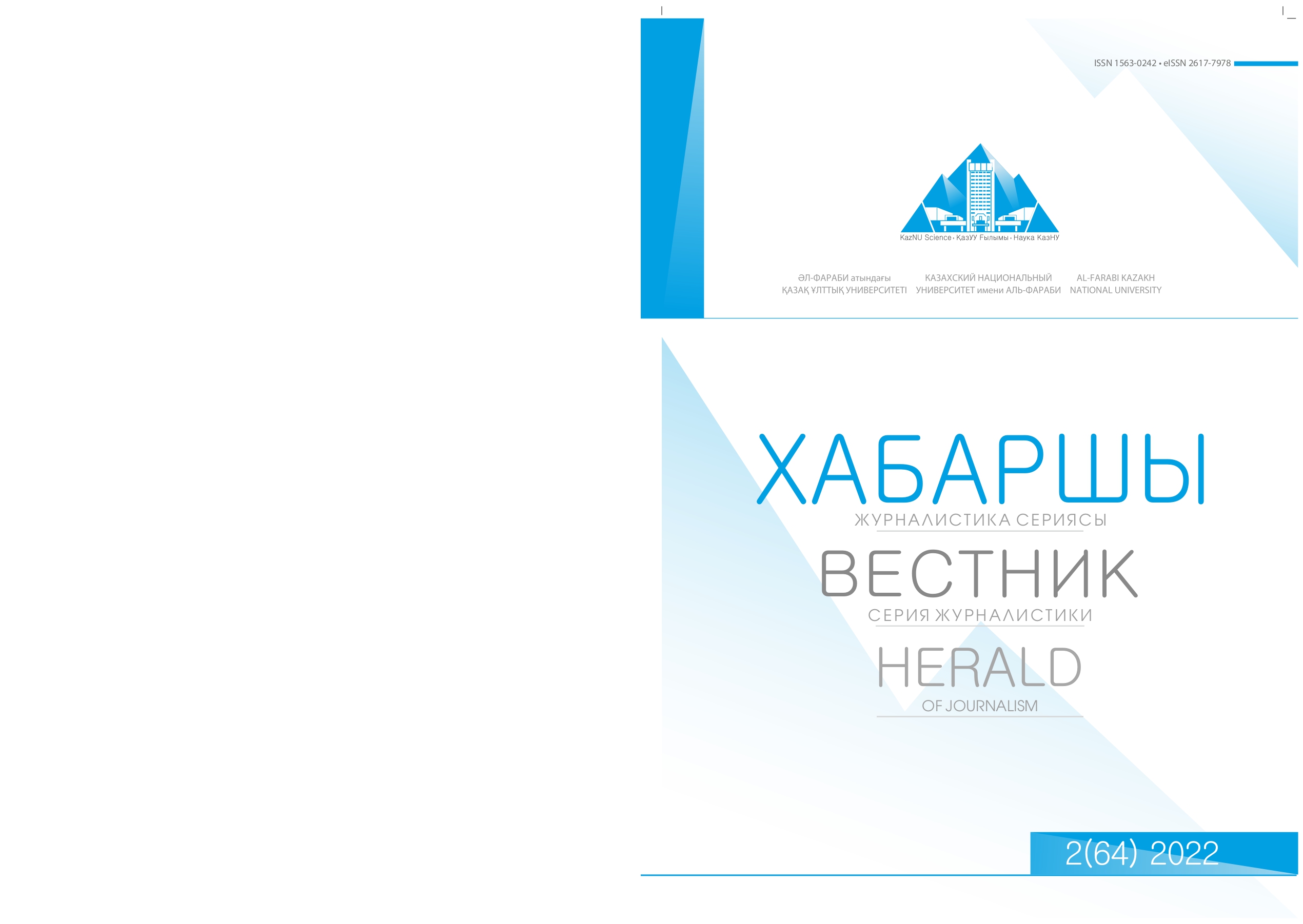The Development of Trolling in Modern Media Space and Social Networks
DOI:
https://doi.org/10.26577/HJ.2022.v64.i2.011Abstract
This article is devoted to the study of the phenomenon of trolling in the network, which is gaining more and more popularity among users. Based on the study of different stages of the manifestation of trolling, the author proposed to classify them according to psychological, social and political characteristics.
The main purpose of the study is to determine the perception of provocative and aggressive behavior by network users, how closely they are familiar with the terms “troll” and “trolling”, and also to warn them from interacting with potential trolls on the network when consuming content.
Research methods were based on deduction techniques, comparative analysis, retrospection. Moni- toring of foreign sites and scientific materials was used, including popular among young people social networks, namely Instagram and Tiktok. А historical analysis of the emergence and development of in- formation wars was carried out. The aim of the sociological survey was to identify understanding among network users: “What is trolling and why is it dangerous?”.
The scientific novelty of the work lies in the fact that the author for the first time identified and pre- sented the absolute difference between trolling in certain countries like Russia and the United States, and trolling in the expanses of the kaznet.
The results of the study showed that in the modern realities of the existence of trolling is an integral part of ethical ideas in the media space. The development of trolling in social networks has a destructive effect on the interpersonal relationships of users, gaining access to competent, expert opinions and dis- seminating unverified and false information.
Key words: Internet, trolling, social networks, trends, kaznet, cyberbullying.
References
Беспалова В.А. (2017) Троллинг в дискурсе казахстанских новых медиа. КазУМОиМЯ, 6-7
Борисова А.С. (2019) Троллинг как новое социальное явление в системе интернет-коммуникации, 1-4
Внебрачных Р.А. (2012) Троллинг как форма социальной агрессии в виртуальных сообществах, Вестник Удмуртского Университета, Серия: философия, социология, психология, педагогика, Выпуск №1, 48-51
Карабань Н.А. (2018) Речевая агрессия в интернет-общении, Филология: научные исследования, 1-8
Мельникова А.Ю. (2018) Троллинг как новая форма остранения в молодежной культуре, Культурология, 49-59
Какие соц. сети популярны в Центральной Азии (2018) [Электронный ресурс] URL: https://theopenasia.net/ru/post/kakie-sotsseti-populyarny-v-tsentralnoy-azii (дата обращения 12.04.2022).
Bergstrom К. (2011) Do not feed the trolls:Shutting down debate about community expectations on Reddit.com, York University, Volume 16, Number 8 [Электронный ресурс]. URL: https://journals.uic.edu/ojs/index.php/fm/article/view/3498/3029 (дата обращения: 14.04.2022).
Bishop J. (2013) Representation of "trolls" in the media, International Journal of Web Based Communities 10(1): 7-24 [Электронный ресурс]. URL: https://www.researchgate.net/publication/259229799_Representations_of_'trolls'_in_mass_media_communication_A_review_of_media-texts_and_moral_panics_relating_to_'internet_trolling' (дата обращения: 4.04.2022)
Buckels Е. (2014) Trolls just want to have fun, Personality and Individual Differences, 67, 97–102., [Электронный ресурс]. URL: https://www.sciencedirect.com/science/article/abs/pii/S0191886914000324?via%3Dihub (дата обращения: 7.04.2022)
Darryl Cross (2011) Trolling in the Internet space. Felicidad, 7-24
Donath J.1(1996) Identity and Fiction in the Virtual Community, Massachusetts Institute of Technology, 1-19 [Электронный ресурс]. URL: https://www.researchgate.net/publication/2512169_Identity_and_Deception_in_the_Virtual_Community (дата обращения: 12.04.2022)
Hardaker С. (2013) Trolling in computer communication: From user discussions to academic definitions: Journal of Politeness Research Language Behaviour Culture 6(2):215–242, [Электронный ресурс]. URL: https://www.researchgate.net/publication/263568332_Trolling_in_asynchronous_computer-mediated_communication_From_user_discussions_to_academic_definitions (дата обращения: 16.04.2022)
Phillips W. (2015) Trololo. You can’t just take and release a book about trolling, MIT Press, 256
References
Akýlıch M.M. (2012) Trollıng v sotsıalnyh setıah: voznıknovenıe ı razvıtıe. [Trolling in social networks: the emergence and development] Vestnık TıýmGÝ. №8, 10-13
Bespalova V.A. (2017) Trollıng v dıskýrse kazahstanskıh novyh medıa.[Trolling in the discourse of Kazakhstan's new media] KazÝMOıMIa, 6-7
Borısova A.S. (2019) Trollıng kak novoe sotsıalnoe ıavlenıe v sısteme ınternet-kommýnıkatsıı, [Trolling as a new social phenomenon in the Internet communication system] 1-4.
Vnebrachnyh R.A. (2012) Trollıng kak forma sotsıalnoı agressıı v vırtýalnyh soobestvah, [Trolling as a form of social aggression in virtual communities] Vestnik Ýdmýrtskogo Ýniversiteta, Seriýa: filosofiýa, sociologiýa, psihologiýa, pedagogika, Vipýsk №1, 48-51
Karaban N.A. (2018) Rechevaıa agressııa v ınternet-obenıı, [Speech aggression in Internet communication] Filologiýa; nauchnie issledovaniýa, 1-8
Melnıkova A.Iý. (2018) Trollıng kak novaıa forma ostranenııa v molodejnoı kýltýre, [Trolling as a new form of exclusion in youth culture] Kýltýrologiýa 49-59
Kakie sots. seti populýarni v Tsentral’noi Azii (2018) [Digital source] URL: https://theopenasia.net/ru/post/kakie-sotsseti-populyarny-v-tsentralnoy-azii (дата обращения 12.04.2022).
Bergstrom К. (2011) Do not feed the trolls: Shutting down debate about community expectations on Reddit.com, York University, Volume 16, Number 8 [Digital source]. URL: https://journals.uic.edu/ojs/index.php/fm/article/view/3498/3029 (date of reference: 14.04.2022).
Bishop J. (2013) Representation of "trolls" in the media, International Journal of Web Based Communities 10(1): 7-24 [Digital source]. URL: https://www.researchgate.net/publication/259229799_Representations_of_'trolls'_in_mass_media_communication_A_review_of_media-texts_and_moral_panics_relating_to_'internet_trolling' (date of reference: 4.04.2022)
Buckels Е. (2014) Trolls just want to have fun, Personality and Individual Differences, 67, 97–102., [Digital source]. URL: https://www.sciencedirect.com/science/article/abs/pii/S0191886914000324?via%3Dihub (date of reference: 7.04.2022)
Darryl Cross (2011) Trolling in the Internet space. Felicidad, 7-24
Donath J.1(1996) Identity and Fiction in the Virtual Community, Massachusetts Institute of Technology, 1-19 [Digital source]. URL: https://www.researchgate.net/publication/2512169_Identity_and_Deception_in_the_Virtual_Community (date of reference: 12.04.2022)
Hardaker С. (2013) Trolling in computer communication: From user discussions to academic definitions: Journal of Politeness Research Language Behaviour Culture 6(2):215–242, [Digital source]. URL: https://www.researchgate.net/publication/263568332_Trolling_in_asynchronous_computer-mediated_communication_From_user_discussions_to_academic_definitions (date of reference: 16.04.2022)
Phillips W. (2015) Trololo. You can’t just take and release a book about trolling, MIT Press, 256













